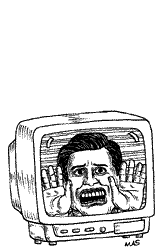
Movies
The Truman Show (Paramount Pictures). Raves mount for the summer smash, in which Jim Carrey plays a man whose entire life has been televised without his knowledge. "[T]he nerviest feature to come out of Hollywood in recent memory," says the Los Angeles Times' Kenneth Turan. Reviewers say director Peter Weir's comedy about Orwellian mind control and entertainment-age pop culture "nails the Zeitgeist" (Jay Carr, the Boston Globe). Dissenters declare The Truman Show overhyped considering its clunky plot and simple-minded message, which boils down to "[E]ither you are a grotesque victim of the moguls or an unmitigated rebel" (Edward Rothstein, the New York Times). (Click here for the official site and here for David Edestein's review in Slate.)
A Perfect Murder (Warner Bros.). Alfred Hitchcock's 1954 thriller Dial M for Murder transposed to Manhattan, "sexed up, opened out, and finished off with a disappointing bang-bang climax" (Edelstein, Slate). Surprisingly, many critics declare it better than the stagy original, "more fluent and sensuous" (Stephen Holden, the New York Times). The virtues of the remake: It has a darker edge and a stronger cast, which includes Gwyneth Paltrow, Viggo Mortensen, and Michael Douglas. It's also said to replicate the original's flaws, in that it isn't very scary. (Click here for the official site.)
Kurt and Courtney (Roxie Releasing). Critics welcome the chance to review British documentarian Nick Broomfield's controversial portrait of grunge rockers Courtney Love and Kurt Cobain. The film, which considers (then rejects) the theory that Love murdered Cobain, was pulled from this year's Sundance Film Festival when Love threatened to sue. Reviewers delight in Broomfield's portrayal of Love as a violent control freak. "Ms. Love shreds her own credibility," says the New York Times' Jon Pareles. A few attack Broomfield, who also made a film about Hollywood madam Heidi Fleiss, as a "lame sensationalist" engaged in "character assassination" (Jack Mathews, Newsday).
Television
Sex and the City (HBO; Sundays, 9 p.m. ET/PT). Critics roll their eyes at HBO's latest sitcom, an adaptation of sex columnist Candace Bushnell's memoirs. They chide the series, produced by Melrose Place creator Darren Star, for being unfunny and sodden with easy moral outrage at the jet-set crowd. "Is it any wonder that the self-absorbed, the promiscuous, the drugged and the drunk ... lead lonely, empty lives?" (Barbara Phillips, the Wall Street Journal). Sarah Jessica Parker, who plays the Bushnell character, is said to lack her usual charm. "She's in love with the camera. Unfortunately, it's unrequited" (Tom Shales, the Washington Post). (Click here for the show's risqué site.)

Theater
The Tony Awards. Broadway congratulates itself on its recent success--ticket sales increased 12 percent this year--which critics grudgingly attribute to investments by Disney and Michael Ovitz's company Livent. "This season Broadway went corporate," says New York's Jeremy Gerard. The revived awards show also gets credit, especially its emcee, Rosie O'Donnell, who proselytizes incessantly for the Great White Way. Sourpusses call O'Donnell a tacky host: "Are Tampax jokes that funny?" (Clive Barnes, the New York Post).
Art
"Edward Burne-Jones, Victorian Artist-Dreamer" (Metropolitan Museum of Art, New York City). The first American retrospective for the 19th century English pre-Raphaelite tries to redeem him from his reputation as a sentimentalist. It partly succeeds. Some critics celebrate Burne-Jones' use of eclectic media (paint, tapestry, stained glass) and varied imagery (Arthurian, classical, pastoral). Others continue to dismiss his work as sappy and say he "can't paint very well" (Mark Stevens, New York). Time's Robert Hughes says Burne-Jones has become popular because "confrontational Modernism is losing its mandate in our fin de siècle." (Click here for Christopher Benfey's review of the show in Slate.)
Book
Cold New World: Growing Up in a Harder Country, by William Finnegan (Random House). High praise for The New Yorker writer's stories about disaffected youth. Critics applaud Finnegan for his in-depth reporting and sympathetic portrayal of the lives of a gang banger, a crack dealer, and a skinhead. A few carp that Finnegan's dry prose shows how far literary journalism has fallen from the pyrotechnics of its originators, such as Tom Wolfe. Others take issue with Finnegan's claim that these are especially hard times to grow up in: "One wants to ask, 'Harder compared to what?' To life in the Dust Bowl during the Great Depression?" (Lance Morrow, Time).
Recent "Summary Judgment" columns
Movie--The Last Days of Disco;
Movie--Hope Floats;
Television--More Tales of the City (Showtime);
Television--A Bright Shining Lie (HBO) and Thanks of a Grateful Nation (Showtime);
Art--"Mark Rothko";
Theater--Corpus Christi.
Movie--Godzilla;
Movie--Fear and Loathing in Las Vegas;
Movie--Cannes Film Festival Roundup;
Book--Freedomland, by Richard Price;
Books--Remembering Mr. Shawn's "New Yorker": The Invisible Art of Editing, by Ved Mehta; Here But Not Here: A Love Story, by Lillian Ross;
Television--The Larry Sanders Show (Showtime).
Death--Frank Sinatra;
Television--Seinfeld finale;
Movie--Bulworth;
Movie--The Horse Whisperer;
Book--The Everlasting Story of Nory, by Nicholson Baker;
Book--Cities of the Plain, by Cormac McCarthy;
Book--Identity, by Milan Kundera, translated by Linda Asher.
Movie--Deep Impact;
Movie--Character;
Music--Into the Sun, by Sean Lennon;
Book--Titan: The Life and Times of John D. Rockefeller, by Ron Chernow;
Book--The Time of Our Time, by Norman Mailer;
Book--A Widow for One Year, by John Irving.
--Franklin Foer
